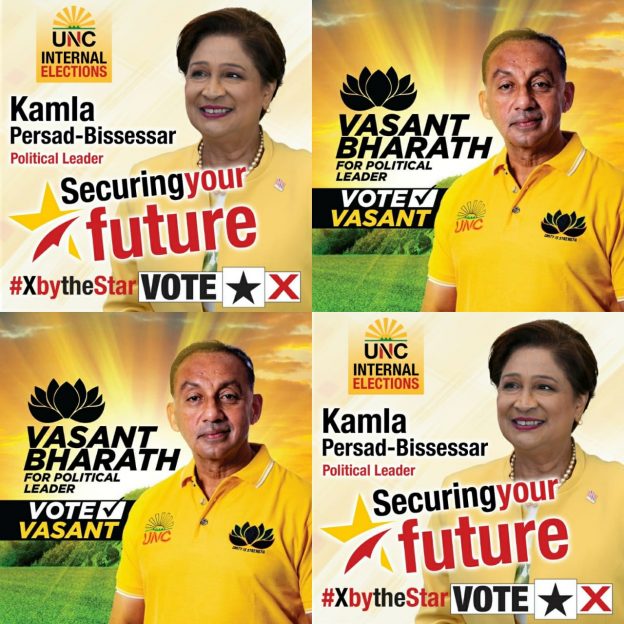IN 2010, a lot in Trinidad and Tobago (T&T) politics was about to change.
For the first time we had a woman political leader when Kamla Persad-Bissessar defeated Basdeo Panday to lead United National Congress (UNC).
Before this, Persad-Bissessar had called on the then UNC political leader Panday, to resign following his successive election defeats.
Many thought that anyone who challenged Panday at that level would not be successful as was the case of Winston Dookeran earlier.
This reminds me of a quote by the leadership coach John C Maxwell, “A leader’s lasting value is measured by succession.”
History seems to repeat itself when now in 2020.
Panday said in an interview recently, regarding the 2020 general elections, “Given that things remain the same with the two ethnically based parties, I think the People’s National Congress (PNM) will win.”
Be it a cry of sour grapes or an objective opinion, his words have come to pass.
Irrespective of whosoever assumes leadership of a political party, his or her defeated opponents are still members of the party at the end of the day, and for members of the party, the party should come first.
Its continued relevance and success depend on its members, be he/she a past leader or not, to support the current leader despite differences in opinion.
Such a character is indeed a virtue of a true leader.
Persad-Bissessar’s win in January of 2010 paved her way to win the general election in May 2010 and become very first female Prime Minister of T&T.
Many factors contribute to this general election win. Apart from the attractive idea that T&T will have its first woman prime minister, that fact that she was an Indo-Caribbean woman saw the international Indian diaspora support.
Also, the popularity of Panday, the first ever Indo-Trinidadian prime minister of T&T and founder of the UNC, began to decline in 2001.
Within one year after winning the 2000 general election and serving a second term as prime minister, he was forced to call another call general election.
This as he had lost the majority in the parliament after a fallout with colleagues on his own side of government, who accused him with corruption.
The following 2001 general election resulted in a tie between the two major parties of the UNC and PNM meaning a constitutional crisis for T&T.
Both parties agreed to abide by the decision of the president ANR Robinson, as to who would lead the government, as well as to form a unity government.
Being a tough decision for Robinson, he untimely chose the then leader of the PNM Patrick Manning because of the his “moral and spiritual values” as the then president put it.
Finding these words unsatisfactory, Panday had no choice but to become the opposition leader.
The UNC continued to decline in the coming years while in opposition. During the UNC’s internal election in 2005, Panday nominated Dookeran as his successor for the leadership of the party.
He himself retained the position of chairman. The following month, Jack Warner called for Panday to handover the Leader of the Opposition to Dookeran as well.
He failed to do so and in September 2006, Dookeran announced that he was leaving the UNC to from his own political party the Congress of the People (COP).
This saw key UNC members leaving the party to join the COP.
This further dwindled the UNC support and Panday’s popularity.
Earlier in April 2006, Panday was convicted on charges of failing to declare his London bank account thus revoking his position as leader of the opposition.
This gave Persad-Bissessar an opportunity to temporarily serve as Leader of the Opposition until Panday was reinstated in January 2007 being cleared of the charges.
This short stint as Opposition Leader gave Persad-Bissessar a moment to shine and show the nation what was possible.
This certainly served to set her sights on challenging Panday for the leadership of the UNC in 2010, a decision that lead her ultimately to become the prime minister of T&T.
For the third time the UNC formed the government of T&T until she, like Panday, saw successive losses at the polls, both local and general elections.
This included the 2015 and recent 2020 general elections.
The UNC’s internal election is now due on December 6, 2020.
Persad-Bissessar and former UNC MP and ex-minister of trade under a UNC coalition government Vasant Bharat are the candidates for political leader.
Many from Bharat’s camp have called Persad-Bissessar a hypocrite, going against her own advice when she called for Panday’s resignation as UNC political leader due to his consecutive election losses.
Whoever wins the next internal election and emerges the next UNC political leader has the task at hand to make the UNC a viable option on its own to form the next government.
Many are calling for change of the leadership while others have endorsed Persad-Bissessar for yet another try at the national polls.
It is yet to be seen if history will once again repeat itself and if Persad-Bissessar would be only a one hit wonder.
Dr Visham Bhimull is a medical doctor with an interest in the history, language and culture of T&T
Credit: http://azpnews.com/unc-internal-elections-a-lesson-in-leadership/
Donate
Please consider Donating to keep our culture alive



Leave a Reply
You must be logged in to post a comment.